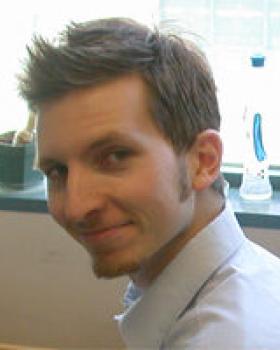University of California, Berkeley | Plant & Microbial Biology
TSharpton

- Graduate Student
It was as a biochemistry and biophysics student at Oregon State University, that I became interested in DNA. I thought it amazing that four similarly shaped molecules could, when arranged in a particular order, provide instructions to create a living organism. Better still, different permutations of this genetic code could result in wholly different organisms. This naturally led into an interest in molecular evolution and biodiversity. Understanding the total amount of genetic diversity on Earth, how the environment shapes the evolutionary trajectory of genomes, and the how the processes of mutation and adaptation can create new phenotypes alter the organism's environment are topics that occupy a significant chunk of the curious part of my mind.
My graduate research has focused on understanding how fungal genomes have evolved. I use comparative genomic, molecular evolutionary and phylogenetic tools to evaluate whole genome sequences and determine how they have evolved. A research internship at the Broad Institute introduced me to a computational environment and to the Cryptoccocus genomes, a dataset I analyzed to identify rates and mechanisms of eukaryotic intron loss. I have also investigated the Onygenales, which includes the human pathogen Coccidioides. In particular, I have evaluated how gene gain and loss, chromosomal rearrangements, and natural selection have shaped the evolutionary trajectory of these genomes. In addition, I am applying population genetic analyzes to multiple individual genome sequences from the Coccidioides species complex to evaluate how genomes evolve at the population level.
I graduated from UC Berkeley in May 2009 and currently work at the Gladstone Institute at UCSF. For more information on my background and interests, visit my web page at the Gladstone Institute.
Publications:
- Thomas J Sharpton, Guillaume Jospin, Dongying Wu, Morgan GI Langille, Katherine S Pollard and Jonathan A Eisen. 2012. Sifting through genomes with iterative-sequence clustering produces a large, phylogenetically diverse protein-family resource. BMC Bioinformatics 13:264.
- Whiston, E., Wise, H.-Z., Jui, G., Sharpton, T. J., Cole, G. T., J. W. Taylor. 2012. Comparative transcriptomics of the saprobic and parasitic growth phases in Coccidioides spp. PLoS One 7: e41034.
- Thomas J. Sharpton, Samantha J. Riesenfeld, Steven W. Kembel, Joshua Ladau, James P. O’Dwyer, Jessica L. Green, Jonathan A. Eisen and Katherine S. Pollard. 2011. PhylOTU: a high-throughput procedure quantifies microbial community diversity and resolves novel taxa from metagenomic data. PLoS Comput Biol 7(1): e1001061. doi:10.1371/journal.pcbi.1001061.
- Neafsey, DE, Barker, BM, Sharpton TJ, Stajich, JE, Park, D, et. al. 2010. Population genomic sequencing of Coccidioides fungi reveals recent hybridization and transposon control. Genome Research 20: 938-946.
- Thomas J. Sharpton, Jason E. Stajich, Steven D. Rounsley, Malcolm J. Gardner, Jennifer R. Wortman, Vinita S. Jordar, Rama Maiti, Chinnappa D. Kodira, Daniel E. Neafsey, Qiandong Zeng, Chiung-Yu Hung, Cody McMahan, Anna Muszewska, Marcin Grynberg, M. Alejandra Mandel, Ellen M. Kellner, Bridget M. Barker, John N. Galgiani, Marc J. Orbach, Theo N. Kirkland, Garry T. Cole, Matthew R. Henn, Bruce W. Birren, and John W. Taylor. 2009. Comparative genomic analyses of the human fungal pathogens Coccidioides and their relatives. Genome Research 19(10): 1722-1731.
- Thomas J. Sharpton, Daniel E. Neafsey, James E. Galagan and John W. Taylor. 2008. Mechanisms of intron gain and loss in Cryptococcus. Genome Biology 2008, 9:R24 (doi:10.1186/gb-2008-9-1-r24).
- Sharpton, TJ and Jhaveri AJ. 2006. Leveraging the Knowledge of our Peers: Online communities hold the promise to enhance scientific research. PLOS Biology 4(6): 904-905.
